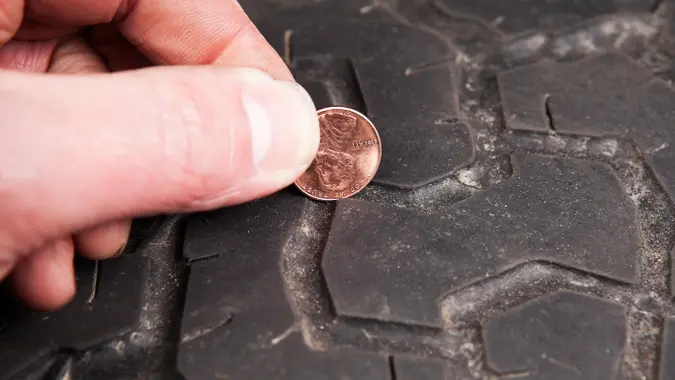Planning for the Future: A Step-by-Step Will Writing Guide

Commitment to Our Readers
GOBankingRates' editorial team is committed to bringing you unbiased reviews and information. We use data-driven methodologies to evaluate financial products and services - our reviews and ratings are not influenced by advertisers. You can read more about our editorial guidelines and our products and services review methodology.

20 Years
Helping You Live Richer

Reviewed
by Experts

Trusted by
Millions of Readers
Thinking about death may be uncomfortable, but creating a plan for what happens to your assets and loved ones can give you peace of mind. Knowing how to write a will ensures that your wishes are followed and your family can grieve without added legal complications.
Understanding the Basics: What Is a Will?
At the heart of your estate plan lies the will — a pivotal legal document dictating the fate of your assets posthumously. For parents, the will appoints a guardian for children who haven’t reached maturity. Additionally, it identifies your executor, the individual entrusted with enacting your stated wishes.
What Happens if You Die Without a Will?
Each state has its own laws describing what happens to your estate if you die without a will. Depending on your residency, potential outcomes include:
- In community property states, spouses typically inherit. In other cases, assets might go to children from another partner, your parents or siblings.
- Single and childless? If your parents are alive, they’re likely the beneficiaries.
- Beneficiaries may endure prolonged waiting and even need legal assistance as assets undergo the probate process.
In cases with multiple marriages or tense relationships, disputes can arise. Writing a will simplifies matters, giving clarity to your preferences.
What Are the Main Rules of Writing a Will?
The most important will writing rule is to follow your state’s requirements so you create a valid document. Find out what information needs to be included, the number of witnesses you need and whether you need a notary.
Questions To Ask Yourself
After you understand the legal requirements for a valid will, you need to make a few decisions. Start by answering the following questions:
- What are your assets? This includes bank accounts, furniture, clothing, pets, collectibles, investments, family heirlooms and other property.
- Who do I want to get my money and assets after I die? You can choose more than one person and you can specify who gets what.
- If that person dies before I do, who can take their place?
- Who do I want to care for my children if I die before they are adults?
- Are there special circumstances to consider? For example, an heir who might mismanage a sizable inheritance?
- Who’s trustworthy enough to act as your estate’s executor?
Once you’ve made these decisions, you can start writing your will.
How To Write a Will: Step-by-Step Guide
Crafting a will might seem overwhelming, but with the right guidance, you can draft this crucial document from the comfort of your own home. Here are some steps to follow:
- Start with a title
- Designate asset recipients
- Appoint an executor
- Nominate a guardian for young children
- Finalize the will legally
1. Start With a Title
Begin your will with the title “Last Will and Testament” for clarity. Include your personal details to confirm your identity. State that you’re making this will with a clear mind and that it replaces any older wills to avoid confusion about your latest wishes.
Good To Know
If you’re overwhelmed by the idea of creating a will, many online services offer templates tailored to specific states. Additionally, certain states provide statutory wills, ideal for simpler estates. You just need to complete these ready-made forms with your details and follow the signature guidelines.
2. Designate Asset Recipients
Clearly specify who gets what from your assets. If your main beneficiaries pass away before you or can’t receive the assets, it’s good to have a backup plan in the will to ensure a smooth transfer.
3. Appoint an Executor
Pick someone trustworthy to make sure your will is followed, whether it’s a friend, family member or a professional. Given unexpected events, it’s smart to also name a backup executor.
4. Nominate a Guardian for Young Children
If you have young children, it’s crucial to choose a guardian in your will. This person will care for your kids until they’re adults. Pick someone who shares your views on raising children and always get their agreement before naming them.
5. Finalize the Will Legally
For the will to be legal, sign it with two witnesses who aren’t beneficiaries. Some states might also need a notary. Store the will safely, like in a safety deposit box at a bank, and make sure the executor knows where it is. Remember to update your will if big changes happen in your life.
Final Take
Understanding how to write a will is all about finding the approach that aligns with your comfort. Whether you prefer using an online platform, writing it yourself or consulting a lawyer for intricate estates, it’s vital to take action immediately to ensure the proper allocation of your assets in the future.
FAQ
Here are the answers to some of the most frequently asked questions regarding writing a will.- What are the seven steps of preparing a will?
- Here are seven essential steps to prepare a will:
- Evaluate your assets and debts: Before starting, make an inventory of everything you own — properties, investments, jewelry and other valuables. Make sure you take note of any outstanding debts.
- Determine beneficiaries: Decide who will inherit your assets. This could be family members, friends or even charitable organizations.
- Choose an executor: Select a trustworthy individual who will ensure that your will is executed as per your wishes.
- Select a guardian: If you have minor children, decide who will be their legal guardian in your absence.
- Consult state laws: Every state has different requirements for making a will valid, like the number of witnesses required. Ensure you're aware of your state's specific rules.
- Draft the will: Begin writing your will, detailing how you want your assets to be divided and specifying any other wishes, such as funeral arrangements.
- Sign and store safely: After finalizing the will, sign it in the presence of witnesses. Store the original document in a safe place and inform your executor about its location.
- Here are seven essential steps to prepare a will:
- What is the best way to write a simple will?
- The best approach for a simple will is to first list your assets and decide who gets what. Using online templates tailored for your state can help, or you can consult a local attorney for guidance. The key is to be clear and precise.
- What are the main rules of writing a will?
- Here are some rules to know when writing a will:
- The person writing must be of sound mind and usually over 18.
- The document should clearly state it's a will.
- It should be signed in front of at least two people who aren't getting anything from it.
- The person writing the will should sign and date it.
- List clearly who gets which assets.
- Follow any specific rules your state might have.
- Update it as life changes occur.
- Here are some rules to know when writing a will:
- How many pages is a simple will?
- A simple will can be just one page, but some are longer. What's important is that it clearly states your wishes and follows legal rules, not how long it is.
Karen Doyle and Allison Hache contributed to the reporting for this article.
Editor's note: This article was produced via automated technology and then fine-tuned and verified for accuracy by a member of GOBankingRates' editorial team.
Our in-house research team and on-site financial experts work together to create content that’s accurate, impartial, and up to date. We fact-check every single statistic, quote and fact using trusted primary resources to make sure the information we provide is correct. You can learn more about GOBankingRates’ processes and standards in our editorial policy.
- LegalZoom. "How To Write My Own Will - Legal Info."
- FindLaw. 2019. "What Happens If You Die Without a Will?"
- FindLaw. 2023. "What Happens If You Die Without a Will?"
- Trust & Will. "What to Include in a Will: Property, Assets & More."
- FindLaw. 2023. "How To Choose an Executor For Your Will."
- No.o. "How to Safely Store Your Will | Last Will and Testament."
- LawDepot. 2022. "Free Last Will and Testament."
- Nolo. "Statutory Will Forms."
 Written by
Written by 

























